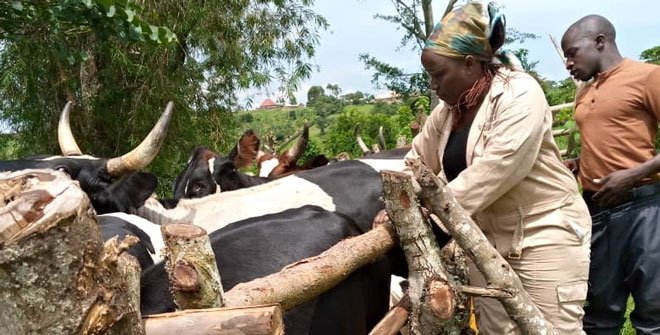
Mbarara, Uganda | Dr. Philip Brian Barekye | In Uganda, Veterinary doctors or Veterinary Surgeons are solely trained at Makerere University. This is perhaps due to the requisite high level of infrastructure and manpower needed to equip the learners with globally recommended day one competencies of the professionals.
However, other higher institutions of learning such as Ankore Western University, Busitema University-Arapai Campus-Soroti, Bishop Stuart University-Mbarara etc offer degree courses in Animal health.
Bukalasa Agricultural College and Ssese Farm Institute among other institutions also offer diploma and certificate courses in Animal health and Production. Graduates from these recognized teaching institutions by the National Council for Higher Education and the Uganda Veterinary Board/Council are thereafter Lisenced in accordance with the Veterinary Practitioners Act to offer professional veterinary services. This serves to regulate professional practices and ensure harmony and excellence in veterinary services provision across the country.
 Due to various efforts by the state and other development partners in Agriculture such as USAID, UN-FAO and NGOs, Veterinary practice has registered significant positive changes and is on a steady trajectory to modernization.
Due to various efforts by the state and other development partners in Agriculture such as USAID, UN-FAO and NGOs, Veterinary practice has registered significant positive changes and is on a steady trajectory to modernization.
The increasing value of land and animal products across the country stimulates increased demand for community based private veterinary services to optimize livestock resource utilization.
There is thus an increase in public-private partnerships and improved coordination and networking efforts among Veterinary practitioners.
Since Land is increasingly becoming scarcer, there is insatiable demand for modern techniques like Artificial Insemination and many professionals have been equipped with the requisite skills to offer services to the farmers.
With the latest Veterinary Practitioners 2023 Act and other relevant policies, the practice landscape is richer and thus presents an enabling environment for many specialties to thrive.
It is important for every professional to keep their clinical skills sharp and knowledge levels continually improved through Continuous professional development, networking and commitment to service.
Farmers are always encouraged to discuss matters relating to disease prevention, modern animal husbandry practices and Agribusiness with extension workers.
The national Agriculture extension system if fortified with more workforce, equipment and infrastructure has the potential to achieve increased household incomes and secure employment for many citizens engaged in Agriculture.
Interdisciplinary skills possessed by Veterinarians help to synthesize how land management decision making is done and this greatly enables farmers to adopt climate smart farming practices. This also comes in handy during zoonotic outbreak responses where the one health principles are applied to ensure global health security.
Continued agricultural productivity and the ability to feed Uganda’s growing population hinges on the understanding of professionals in resource interpretation to examine the various needs of different agricultural landscapes e.g grassland management in the savannah, urban farming and pastoralism in the semi-arid areas.
Wildlife Veterinarians are trained to deliver specialized wildlife health care and conservation by conducting surveillance, providing veterinary clinical care to wildlife populations and engaging with communities to ensure sustainable coexistence. This ensures protection of some endangered iconic species for posterity.
Senior Veterinary Officers within Uganda’s public service stand tall in mentoring the next generation of proactive practitioners in the principles of veterinary service provision. These are often not uncommon in training institutions as facilitators and administrators.
Whereas Animal Production is often fused with health in Veterinary practice, the two are gaining the inevitable separation and interpretation due to the increasing desire for specialized livestock production professionals.
The decentralized system of administration in Uganda presents a strategic avenue for the absorption of many veterinary professionals into service of their country as Veterinary Officers(VOs), Assistant Veterinary Officers(AVOs), Animal Husbandry officers(AHOs), Laboratory technicians etc.

Other Veterinary professionals are able to secure employment in Ministries and Agencies as Veterinary Inspectors, regulation officers, Directors of departments and Commissioners.
Veterinarians in academic institutions often serve as lecturers, Senior Lecturers, Professors and Administrators. These conduct lectures and research to contribute to the general body of knowledge and intellectual discourse for the growth and development of the country.
There have been members serving in the armed forces as Veterinary surgeons and Forensic scientists.
The business community also enjoys presence of various Veterinary professionals especially in Agricultural products trade, real estate development, manufacturing and import trade.
Whereas it is often not realized, various community development projects and programs thrive on the progression of veterinary knowledge across the populace. These are aimed at stimulating growth by improving household incomes through livestock products. Production in agriculture is essentially hinged on the health of the animals, soil and the crops.
Veterinary professionals are therefore essential health care workers as they play a role in ensuring safe products and mitigation of disease risks.
Veterinary services are currently majorly demand-driven across the country but public veterinary extensionists tend to offer facilitated-supply-driven services in areas where the needs have been assessed.
Being a veterinarian remains prestigious especially among farming communities. Like Lawyers and Consultant health care workers, Lisenced Veterinary practitioners can now feasibly attach a consultation fee to their knowledge on top of the other clinical skills and expertise for the benefit of their Clients.
Thanks to the senior leaders within the Animal industry domain for their efforts to streamline this noble profession that ensures Animal welfare and productivity.
******
 Dr. Philip Brian Barekye serves as a Veterinary Officer with Mbarara District Local Government
Dr. Philip Brian Barekye serves as a Veterinary Officer with Mbarara District Local Government
 The Independent Uganda: You get the Truth we Pay the Price
The Independent Uganda: You get the Truth we Pay the Price



